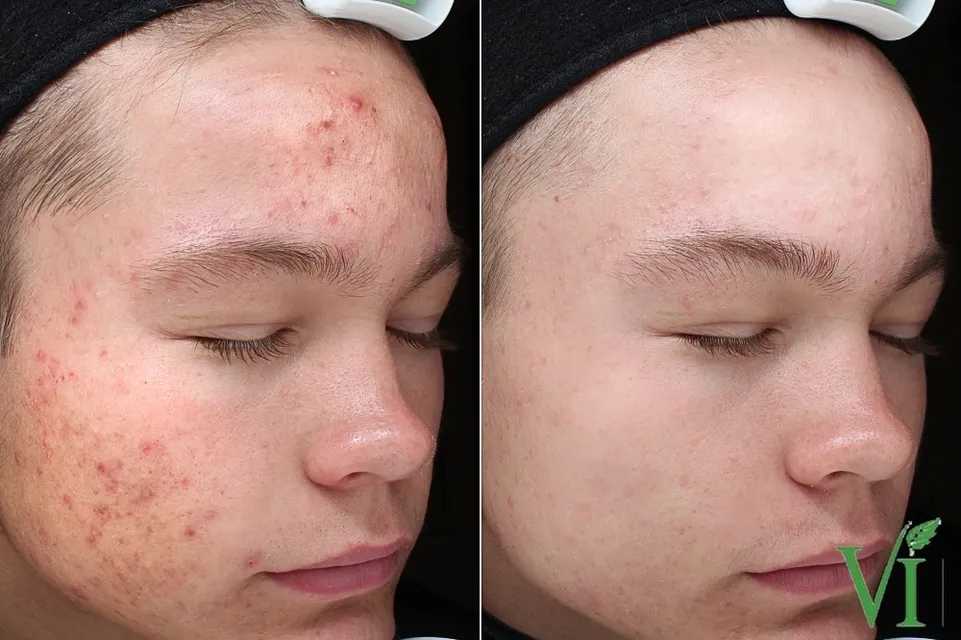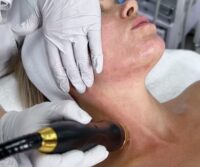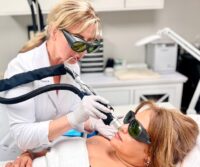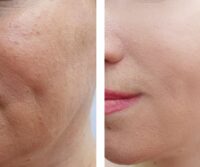
Table of content:
1. Introduction
2. Understanding Acne and Its Treatments
3. The Role of Acne Facials in Skincare
4. Determining Your Acne Facial Frequency
5. Best Practices for Acne Facials
6. Acne Facials in Clearwater: What to Look For
7. Conclusion: Embracing a Holistic Approach to Acne Management
8. FAQs
Introduction
Acne is a common skin concern that affects many people. It can be frustrating and challenging to manage.
Facials specifically designed for acne-prone skin can be a game-changer. They can help reduce breakouts, calm inflammation, and promote healthier skin.
But how often should you get these acne facials? This is a question many people ask.
The answer isn't one-size-fits-all. It depends on various factors, including your skin type, acne severity, and lifestyle.
In this article, we'll delve into the optimal frequency for acne facials. We'll also explore the best acne facial products and treatments, and provide tips for those seeking acne facials in Clearwater.
Understanding Acne and Its Treatments
Acne is a skin condition that occurs when hair follicles become clogged with oil and dead skin cells. It's characterized by blackheads, whiteheads, and pimples.
There are different types of acne, including hormonal, cystic, and stress-induced acne. Understanding the type of acne you have is crucial in choosing the right treatment.
Acne treatments vary widely. They range from over-the-counter products to prescription medications, and from lifestyle changes to professional skincare treatments.
One such professional treatment is the acne facial. This is a specialized facial designed to address the unique needs of acne-prone skin.
Acne facials can include deep cleansing, exfoliation, extractions, and hydration. They can also incorporate specific acne-fighting ingredients like salicylic acid and benzoyl peroxide.

The Role of Acne Facials in Skincare
Acne facials play a significant role in skincare, especially for those with acne-prone skin. They offer a targeted approach to managing acne, focusing on deep cleansing and exfoliation.
These facials help unclog pores, reducing the likelihood of breakouts. They also remove dead skin cells, promoting skin renewal and reducing the appearance of acne scars.
Moreover, acne facials can help balance oil production in the skin. This is crucial as excessive oil can lead to more breakouts.
Here are some key benefits of acne facials:
- Deep cleansing of the skin
- Exfoliation and removal of dead skin cells
- Reduction in the appearance of acne scars
- Balancing of oil production
- Promotion of skin renewal
Incorporating acne facials into your skincare routine can help manage acne more effectively. However, it's important to remember that facials are not a cure-all. They should be part of a comprehensive acne management plan that includes a healthy diet, stress management, and a consistent at-home skincare routine.
Determining Your Acne Facial Frequency
Determining the right frequency for acne facials can be a bit tricky. It's not a one-size-fits-all solution. The frequency should be tailored to your individual skin type and acne severity.
Dermatologists often recommend starting with a facial every 4-6 weeks. This frequency allows your skin to go through its full life cycle of skin cell growth and exfoliation before the next facial.
However, adjustments to this frequency should be made based on your skin's response and professional advice. Overdoing facials can lead to skin irritation and exacerbate acne problems.
Here are some general guidelines for acne facial frequency:
- Start with a facial every 4-6 weeks
- Adjust frequency based on skin's response and professional advice
- Avoid overdoing facials to prevent skin irritation
Factors That Influence Facial Frequency
Several factors can influence the frequency of your acne facials. Understanding these factors can help you make an informed decision about your facial regimen.
Firstly, your skin type and acne severity play a crucial role. Those with severe acne may benefit from more frequent facials, while those with mild acne or sensitive skin may require less frequent treatments.
Secondly, professional recommendations and adjustments are key. A skincare professional can assess your skin's response to the facials and adjust the frequency accordingly.
Lastly, lifestyle and environmental considerations can also impact your facial frequency. Changes in weather, stress levels, and diet can all affect your skin's behavior and may necessitate adjustments in your facial regimen.
Skin Type and Acne Severity
Your skin type and the severity of your acne are key factors in determining your facial frequency. Those with oily skin and severe acne may require more frequent facials.
On the other hand, if you have sensitive skin or mild acne, less frequent facials may be more suitable. Overdoing facials can irritate sensitive skin and exacerbate acne problems.
It's important to consult with a skincare professional to determine the best frequency for your specific skin type and acne condition.
Professional Recommendations and Adjustments
Professional recommendations and adjustments are crucial in determining your acne facial frequency. A skincare professional can assess your skin's response to the facials and make necessary adjustments.
For instance, if your skin responds well to the facials and shows improvement, you may be advised to continue with the current frequency. However, if your skin shows signs of irritation or the acne worsens, the frequency may need to be reduced.
Always follow the advice of your skincare professional and communicate any concerns or changes in your skin condition.
Lifestyle and Environmental Considerations
Lifestyle and environmental factors can also influence your acne facial frequency. Changes in weather, for instance, can affect your skin's behavior. You may need more frequent facials during humid summer months when oil production increases.
Stress levels and diet can also impact your skin. High stress levels and a diet high in processed foods can exacerbate acne, potentially requiring more frequent facials.
Remember, it's important to maintain a healthy lifestyle and manage environmental factors to support the effectiveness of your acne facials.
Best Practices for Acne Facials
Acne facials can be a powerful tool in your skincare arsenal. However, to maximize their benefits, it's important to follow some best practices.
Firstly, always consult with a skincare professional before starting any new facial regimen. They can provide valuable advice tailored to your specific skin type and acne condition.
Secondly, remember that facials should be part of a comprehensive acne treatment plan. This plan should also include a healthy diet, stress management techniques, and a consistent skincare routine.
Here are some best practices for acne facials:
- Consult with a skincare professional before starting a new facial regimen
- Incorporate facials into a comprehensive acne treatment plan
- Follow a healthy diet and manage stress levels
- Maintain a consistent skincare routine
Choosing the Right Acne Facial Products
Choosing the right acne facial products is crucial for effective acne management. These products should be non-comedogenic, meaning they won't clog your pores, and suited for sensitive skin.
Ingredients like salicylic acid and benzoyl peroxide are common in acne facial products. These ingredients can help reduce acne by exfoliating the skin and killing acne-causing bacteria.
However, not all skin types react the same way to these ingredients. Some people may find them too harsh, leading to skin irritation. It's important to patch test new products and monitor your skin's response.
Remember, the goal is to manage acne without causing additional skin irritation. Always choose products that are gentle on your skin and effective in treating acne.
Post-Facial Care and Maintenance
Post-facial care is crucial for maximizing the benefits of your acne facials and preventing new breakouts. This involves a consistent skincare routine that complements your facials.
Firstly, always remove makeup before a facial to ensure deep cleansing. After the facial, avoid harsh scrubs or exfoliants as your skin may be more sensitive.
Hydration is key even for oily and acne-prone skin types. Use a non-comedogenic moisturizer to keep your skin hydrated without clogging your pores.
Lastly, always use SPF after facials as your skin can be more sensitive to the sun. Protecting your skin from sun damage can also help prevent future breakouts.
Acne Facials in Clearwater: What to Look For
If you're a Clearwater resident seeking acne facials, there are several factors to consider. Firstly, look for skincare clinics that specialize in acne treatments. These clinics are more likely to have experienced estheticians who understand the complexities of treating acne-prone skin.
Secondly, consider the range of acne facial services offered. Clinics that offer a variety of treatments can provide a more personalized approach to your acne management. This could include facials that incorporate tools like microdermabrasion or ultrasonic devices to enhance results.
One such clinic is Nu Age Aesthetics, located in Clearwater, FL. Nu Age Aesthetics offers specialized acne facial treatments that are customized based on your skin type and acne condition.
Book an AppointmentConclusion: Embracing a Holistic Approach to Acne Management
In conclusion, managing acne is a multifaceted process that goes beyond regular facials. It involves a comprehensive skincare routine, a balanced diet, and a healthy lifestyle. Acne facials, while beneficial, should be seen as a part of this holistic approach.
Remember, consistency is key in seeing results from acne facials and skincare routines. It's also important to manage expectations and understand that facials are not a cure-all for acne. They are, however, a valuable tool in your arsenal for achieving healthier, clearer skin.
Lastly, always consult with a skincare professional before starting any new facial regimen. They can provide valuable advice tailored to your specific skin type and acne severity. This personalized approach can significantly enhance the effectiveness of your acne management strategy.
FAQs
1. Can acne facials help with acne scars?
Yes, acne facials can help reduce the appearance of acne scars through exfoliation, deep cleansing, and promoting skin renewal. While they may not completely eliminate scars, they can improve skin texture and tone over time.
2. Are acne facials suitable for all skin types?
Acne facials can benefit most skin types, including oily, combination, and dry skin. The treatments can be adjusted according to individual needs. Those with sensitive skin should consult with a professional to avoid irritation.
3. What should I do after an acne facial?
Post-facial care is crucial for preventing new breakouts. Avoid using harsh scrubs or exfoliants for a few days. Keep your skin hydrated with a non-comedogenic moisturizer and always apply SPF to protect from sun exposure.
4. Can I combine acne facials with other acne treatments?
Yes, acne facials can be part of a comprehensive acne management plan that includes prescription medications, over-the-counter products, or lifestyle changes. Always discuss combining treatments with a skincare professional to avoid over-irritating your skin.
Book an Appointment


